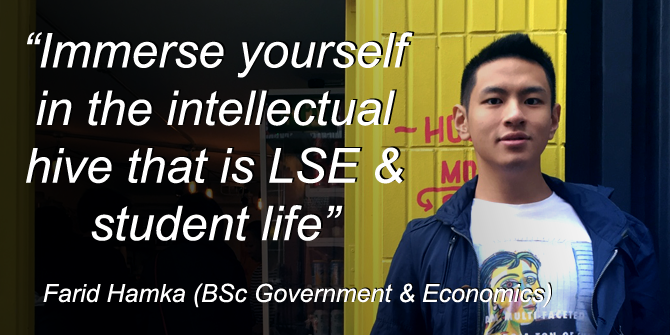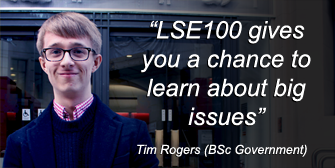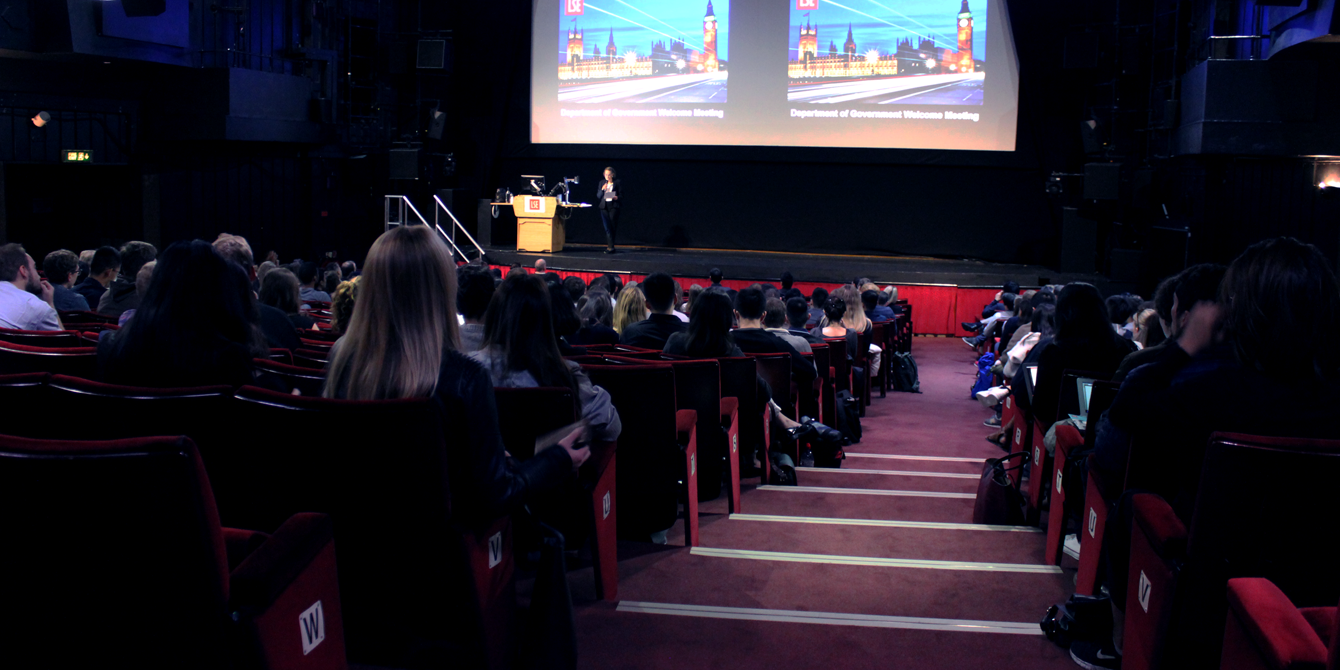
Each year LSE100, LSE’s flagship school-wide interdisciplinary course, awards prizes for exceptional academic performance. 2014-15 was an excellent year for the department, with four of the fifteen awards going to Government students. Professor Michael Bruter interviews John Seeong Woo Lee, Charlotte Spanner, Tim Rogers, and Farid Hamka to find out more about them and their outstanding achievements.
Over my years working as an academic, it has often occurred to me that our students tend to grossly underestimate how proud we are of them. Between colleagues, we fortunately spend far more time speaking of how great they are than about the little hiccups that inevitably occur. One thing about academics is that, for better or for worse, we tend to feel quite confident about our own judgement, so we typically don’t need to wait for our students to win awards to know how brilliant they are. However, to the extent that external validation can support our vision, 2014-15 has been an outstanding vintage for the Department.
Two achievements have been particularly noteworthy. One is that the Government undergraduate dissertation course, GV390, continues with an exceptional record. Since we reformed it, three years ago, our GV390 students have taken five of the LSE’s six places in the ‘Posters in Parliament’ competition, which showcases the best of Undergraduate research across the country (both places went to GV390 students in 2013-14, one in 2014-15, and both again in 2015-16). I will be interviewing some of those proud young researchers in an upcoming article, but for now I want to focus on another amazing achievement.
In June, we learnt that our second year students did exceptionally well in the LSE100 course, which is taken by all LSE students. Of the 1433 students who took the course last year, the fifteen with the highest results received an award. Four of those awards – including both of the top two Worcester awards – went to Government students. The credit for this exceptional departmental success goes to John Seeong Woo Lee (Worcester Prize for best overall performance), Charlotte Spanner (6th best overall performance), Tim Rogers (7th best overall performance), and Farid Hamka (Worcester Prize for best exam performance).
In light of their remarkable achievements, I interviewed Charlotte, Farid, John and Tim to find out more about them, their awards, the LSE100 course and their time at LSE.
Michael: Charlotte, Farid, John, Tim – congratulations on your award! Can you tell me a bit about yourself?
CHARLOTTE: I’m in my final year studying Government and Economics. At the moment I’m enjoying my courses and preparing to start my conversion course at a commercial law firm next year. In my spare time I like to annoy my friends in the library, draw in my sketchbook and I’m learning how to crochet although I’m pretty terrible at it.
FARID: My degree at LSE is BSc in Government and Economics but I branch out a bit when it comes to my outside options, ranging from three foreign languages, to development and European literature. I was born and bred in Jakarta, Indonesia until I was 18 when I decided to pursue education abroad, starting with A-Levels in Brighton. I often find it difficult to list my interests as it can range from modern art to queer politics and the environment but I make sure I learn something new every single day of my life.
JOHN: I’m a final year student at the Government department where I read Government and Economics. I’m originally from Korea, but I’ve spent almost half of my life abroad – briefly in the US and mostly in Southeast Asia. I’ve been in London for a little over two years now, although I visited numerous times before, and I plan to stay in London after graduating.
TIM: I’m a 22-year BSc Government student from just outside London. Outside of my studies I love coffee, good food, travel and technology, and I work part-time as a programmer for a startup, as well as for the LSE’s European Institute! I’m also a committed Christian, involved in the LSESU Christian Union and my local church.
M: Do you have any tips for new Government students who have just started their degree?
CHARLOTTE: I always try to go to all of my classes as it’s usually where I think of ideas and get a sense of direction for essays or formative work. Christmas is a really good ‘half way point’ that can be a lifesaver for catching up with anything you’ve neglected. Most importantly do what makes you happy and enjoy the experience!
FARID: Be multifaceted. Don’t get bogged down on your own modules, try and explore different things outside the department. Having a different perspective that is offered by other disciplines helps you in all sorts of ways! Not to mention that you have your own grounding to offer; you have no idea how much I’ve used the ideas of Machiavelli that I learnt in GV100 in my other courses and in conversations with others. Also, remember that you can learn so much from your surroundings. Learn languages, inquire about your peers’ cultures, befriend them and you will learn much more. Immersing yourself in the intellectual hive that is LSE and student life is the way to get the most from your few years here.
M: Would you say that LSE100 a special course for you?
 TIM: It gives a really great chance to learn about a whole range of things you’d probably never otherwise study, including big issues like gender and how societies should deal with crime, giving you exposure to the literature on these topics rather than thinking about these debates in an uninformed way. I really enjoyed the broad variety of topics.
TIM: It gives a really great chance to learn about a whole range of things you’d probably never otherwise study, including big issues like gender and how societies should deal with crime, giving you exposure to the literature on these topics rather than thinking about these debates in an uninformed way. I really enjoyed the broad variety of topics.
JOHN: I think two key aspects about the course make LSE100 unique. First is the aim to challenge students to leave the comforts of their respective disciplines and to think, perceive, and evaluate the world through an interdisciplinary lens. I think it’s definitely an imperative skill to have in today’s day and age, especially because the issues that we need to grapple present themselves with a complex web of causes that is difficult to disentangle. Second is the variety of ways in which we are assessed because we can take away some valuable practical skills like delivering presentations, group coordination, and writing an academic paper.
M: Did you prepare for the LSE100 assessed work or the exam any differently from your other courses?
FARID: In fact, I prepared for it with significantly less effort than other courses. As long as you dedicate at least 1 hour to finishing the reading and are therefore prepared to have a discussion in class, I think you are safe. I didn’t do additional things except attending most of the lectures and making sure I understood everything discussed in class. I might have also been lucky since my class teachers were very good in steering the class dynamic and giving constructive criticism.
TIM: Not really. It’s definitely harder if you study a predominantly quantitative subject, but for a Government student like me, the skills are pretty similar – it’s about getting into the debates and working out what the authors’ positions on them are.
M: Now imagine you were asked to design a course to be taught to all LSE students. What topics would you cover as part of it?
CHARLOTTE: I think that the LSE100 course covered some really great topics, in particular the climate change, financial crisis and gender modules. If I had to design my own LSE100 course I would probably include some discussion of international terrorism and civil conflict, looking at case studies such as the Arab-Israeli conflict that people often feel difficult discussing. I think it’s really important for people to have a comfortable space to talk about these issues, and to hear multiple sides of an argument.
JOHN: Borrowing a page from LSE100, I’d still recommend a course designed to help develop critical thinking skills by examining contemporary issues in which students can learn how to communicate clearly in writing. I’d also include some aspects that would entail data analysis and research design to develop or reinforce quantitative skills which I think are extremely important tools to possess, especially given today’s global trend of very quantitatively-driven evaluations to convey arguments. Finally, I’d also like to teach a bit of coding – with the current pace of technological innovation and adaptation throughout the world, and with more and more countries incorporating computer science in their school curriculums, I think it’s an indispensable skill to have.
M: And if you were asked to teach your own LSE100 lecture, what would it be on?
JOHN: I wouldn’t trust myself to give a lecture, let alone an LSE100 lecture. However, if I had no choice, I’d probably teach something about development economics with particular case-study focus on East Asian Tiger economies. Having lived in both Korea and Singapore, it would be an interesting opportunity for me to understand the similarities and characteristics of the economic growth that produced such strong economies today, and to apply this understanding to our current study of emerging market countries – not just in Asia but also Latin America and Sub-Saharan Africa.
FARID: Hmm, perhaps it would be something on racial identity or queer theory. I believe that it is possible to really unpack the elemental concept of intersectionality here. Plus, it would be suited to such a diverse environment like LSE and it offers everyone a chance to show their value to the school. I feel that people undervalued the gender module because they dismiss it as irrelevant, even if it concerns their identity, and thus their standing in the world we live in today.
M: Finally, can you tell me about something or someone that inspires you?
TIM: The power of technology to change and reshape all areas of our lives really inspires me, as someone interested in technology and politics (including social policy), and especially wanting to see this applied to the public sector which touches all of our lives. In the UK, the Government Digital Service has revamped people’s experience of government with the new GOV.UK website. I’d love to have the opportunity to use my technical skills in similar ways.
CHARLOTTE: It sounds cliché but I think there is inspiration to be found everywhere, even in the smallest of things – someone who takes the time to run after you to give you back something you dropped for example. A quote which has always inspired me is by Anne Frank: “Despite everything, I still believe people are really good at heart.” It really speaks to me whenever I’m finding things tough. Life can be strange, uncertain and unsettling, but I think it’s all about finding that goodness she speaks of and reminding ourselves what really matters, even when things do go a bit pear shaped!
 LSE100 is LSE’s flagship interdisciplinary course for undergraduate students, designed to broaden and deepen students’ engagement with social scientific analysis using pressing social issues as case studies.
LSE100 is LSE’s flagship interdisciplinary course for undergraduate students, designed to broaden and deepen students’ engagement with social scientific analysis using pressing social issues as case studies.





